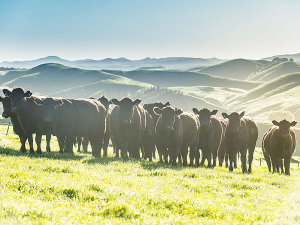NZ Catchment Groups Thrive with ‘Source to Sea’ Approach
The most successful catchment groups in NZ are those that have 'a source to sea' approach.
 The programme will lower the beef sector's greenhouse gas emissions by delivering gas emissions by delivering cows with a smaller environmental hoof-print.
The programme will lower the beef sector's greenhouse gas emissions by delivering gas emissions by delivering cows with a smaller environmental hoof-print.
Dairy farmers are set to benefit from a $17 million beef genetics programme backed by the red meat sector and the Government.
Beef+Lamb New Zealand (B+LNZ) is providing $10m towards the seven-year project Informing New Zealand Beef, the Ministry for Primary Industries will provide the balance.
The project is expected to result in more efficient cows within the next 25 years. The programme is targeting a 10% reduction in greenhouse gas emissions per kilogram of product produced.
Agriculture Minister Damien O'Connor says the programme will lower the beef sector's greenhouse gas emissions by delivering cows with a smaller environmental hoof-print.
"The cows most suited to New Zealand's production systems will be moderate in size, but still highly productive. Moderate sized cows which require less feed will help to lower the impact on soils and produce less methane," says O'Connor.
"To date we've relied on an Australian beef genetics framework, but the time is right to create our own programme tailored to New Zealand conditions."
B+LNZ chief executive Sam McIvor says the programme capitalises on New Zealand's world-leading skills and knowledge in sheep genetics and applies them to the beef industry.
"The data tells us that our beef industry has been lagging behind on genetic progress," he says.
"Not only will this give the industry better genetic tools, but a major focus of the programme is to work with commercial farmers to increase understanding and grow confidence in using genetic information to drive productivity and profitability."
McIvor says dairy farmers also stand to benefit significantly.
"With these new production-focused genetic selection tools, dairy farmers will be able to select semen from beef bulls for artificial insemination in their herds, more confident that they will have shorter gestation, easy calving and produce more valuable calves."
Controls on the movement of fruit and vegetables in the Auckland suburb of Mt Roskill have been lifted.
Fonterra farmer shareholders and unit holders are in line for another payment in April.
Farmers are being encouraged to take a closer look at the refrigerants running inside their on-farm systems, as international and domestic pressure continues to build on high global warming potential (GWP) 400-series refrigerants.
As expected, Fonterra has lifted its 2025-26 forecast farmgate milk price mid-point to $9.50/kgMS.
Bovonic says a return on investment study has found its automated mastitis detection technology, QuadSense, is delivering financial, labour, and animal-health benefits on New Zealand dairy farms worth an estimated $29,547 per season.
Pāmu has welcomed ten new apprentices into its 2026 intake, marking the second year of a scheme designed to equip the next generation of farmers with the skills, knowledge, and experience needed for a thriving career in agriculture.